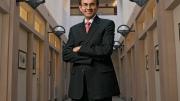“A million mutinies now” was V.S. Naipaul’s 1990 description of the social upheaval then rocking India. “Lurking in that idea,” says Lemann professor Tarun Khanna, Ph.D. ’93, a native of New Delhi, “are a million entrepreneurial ventures, because an entrepreneur is somebody who is exercising productive mutiny against some status quo.” After earning his doctorate in a joint program offered by the economics department and Harvard Business School, which hired him the same year, Khanna staged a mutiny of his own: he shifted his emphasis from hard numbers to the delicate art of integrating Western business models into emerging markets. “I was becoming conscious of the desire to do something for my country of origin and in general for poor countries,” he says. But, as he realized in conversation with his former HBS colleague Yasheng Huang ’85, Ph.D. ’91, nations develop in wildly different ways. Their class on how China’s state-controlled growth differs from India’s democratic scramble for wealth became a 2003 Foreign Policy article. The provocative title (“Can India Overtake China?”) and answer (perhaps!) sparked heated reactions, he says: that it made “a huge amount of sense” or was “completely absurd.” Those who “were not observers of [India] found it surprising because it didn’t mesh with their image.” Today, Khanna sees the status quo changing at his children’s school, where students study China and listen to Indian music. At Harvard, he serves on the South Asia Initiative’s steering committee (see “Global Gains,” January-February, page 64), bringing Asia to the University even as he sends business ideas to his old home.
Tarun Khanna
Tarun Khanna
Harvard Business School professor Tarun Khanna seeks to integrate Western business models into emerging markets.

You might also like
Former Homeland Security Chief Says ICE and CBP Have “Lost Their Way”
At Kennedy School talk, Jeh Johnson advocates restructuring “outdated” DHS.
Open Book: A New Nuclear Age
Harvard historian Serhii Plokhy’s latest book looks at the rising danger of a new arms race.
Harvard Symposium Tackles 400 Years of Homelessness in America
Professors explore the history of homelessness in the U.S., from colonial poor laws to today’s housing crisis
Most popular
Explore More From Current Issue

The Enterprise Research Campus in Allston Nears Completion
A hotel, restaurants, and other retail establishments are open or on the way.

Rabbi, Drag Queen, Film Star
Sabbath Queen, a new documentary, follows one man’s quest to make Judaism more expansive.






